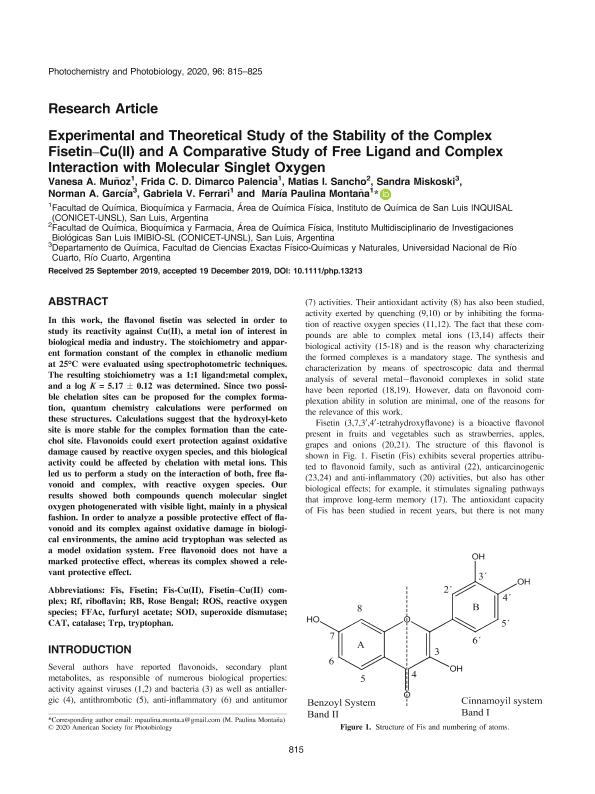Artículo
Experimental and Theoretical Study of the Stability of the Complex Fisetin–Cu(II) and A Comparative Study of Free Ligand and Complex Interaction with Molecular Singlet Oxygen
Muñoz, Vanesa Alejandra ; Dimarco Palencia, Frida Claudia Daniela
; Dimarco Palencia, Frida Claudia Daniela ; Sancho, Matias Israel
; Sancho, Matias Israel ; Miskoski, Sandra
; Miskoski, Sandra ; Garcia, Norman Andino
; Garcia, Norman Andino ; Ferrari, Gabriela Verónica
; Ferrari, Gabriela Verónica ; Montaña, Maria Paulina
; Montaña, Maria Paulina
 ; Dimarco Palencia, Frida Claudia Daniela
; Dimarco Palencia, Frida Claudia Daniela ; Sancho, Matias Israel
; Sancho, Matias Israel ; Miskoski, Sandra
; Miskoski, Sandra ; Garcia, Norman Andino
; Garcia, Norman Andino ; Ferrari, Gabriela Verónica
; Ferrari, Gabriela Verónica ; Montaña, Maria Paulina
; Montaña, Maria Paulina
Fecha de publicación:
07/2020
Editorial:
Wiley Blackwell Publishing, Inc
Revista:
Photochemistry and Photobiology
ISSN:
0031-8655
Idioma:
Inglés
Tipo de recurso:
Artículo publicado
Clasificación temática:
Resumen
In this work, the flavonol fisetin was selected in order to study its reactivity against Cu(II), a metal ion of interest in biological media and industry. The stoichiometry and apparent formation constant of the complex in ethanolic medium at 25°C were evaluated using spectrophotometric techniques. The resulting stoichiometry was a 1:1 ligand:metal complex, and a log K = 5.17 ± 0.12 was determined. Since two possible chelation sites can be proposed for the complex formation, quantum chemistry calculations were performed on these structures. Calculations suggest that the hydroxyl-keto site is more stable for the complex formation than the catechol site. Flavonoids could exert protection against oxidative damage caused by reactive oxygen species, and this biological activity could be affected by chelation with metal ions. This led us to perform a study on the interaction of both, free flavonoid and complex, with reactive oxygen species. Our results showed both compounds quench molecular singlet oxygen photogenerated with visible light, mainly in a physical fashion. In order to analyze a possible protective effect of flavonoid and its complex against oxidative damage in biological environments, the amino acid tryptophan was selected as a model oxidation system. Free flavonoid does not have a marked protective effect, whereas its complex showed a relevant protective effect.
Palabras clave:
FISETIN
,
DFT
,
COMPLEX
,
SINGLET MOLECULAR OXYGEN
Archivos asociados
Licencia
Identificadores
Colecciones
Articulos(IMIBIO-SL)
Articulos de INST. MULTIDICIPLINARIO DE INV. BIO. DE SAN LUIS
Articulos de INST. MULTIDICIPLINARIO DE INV. BIO. DE SAN LUIS
Articulos(INQUISAL)
Articulos de INST. DE QUIMICA DE SAN LUIS
Articulos de INST. DE QUIMICA DE SAN LUIS
Citación
Muñoz, Vanesa Alejandra; Dimarco Palencia, Frida Claudia Daniela; Sancho, Matias Israel; Miskoski, Sandra; Garcia, Norman Andino; et al.; Experimental and Theoretical Study of the Stability of the Complex Fisetin–Cu(II) and A Comparative Study of Free Ligand and Complex Interaction with Molecular Singlet Oxygen; Wiley Blackwell Publishing, Inc; Photochemistry and Photobiology; 96; 4; 7-2020; 815-825
Compartir
Altmétricas



